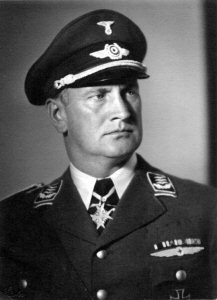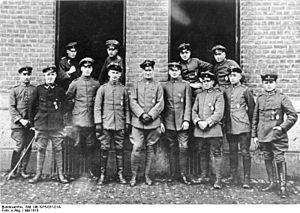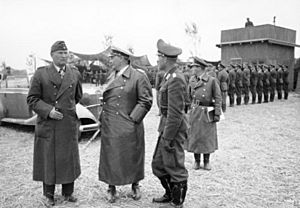Bruno Loerzer facts for kids
Quick facts for kids
Bruno Loerzer
|
|
|---|---|
 |
|
| Born | 22 January 1891 Berlin, German Empire |
| Died | 23 August 1960 (aged 69) Hamburg, West Germany |
| Allegiance | |
| Service/ |
|
| Years of service |
|
| Rank | |
| Wars | |
| Awards | |
Bruno Loerzer (born January 22, 1891 – died August 23, 1960) was a German air force officer. He served during both World War I and World War II. In World War I, he was one of Germany's top flying aces. He achieved 44 aerial victories. He also commanded one of the first German fighter wings.
Loerzer was a close friend of Hermann Göring. This friendship helped Loerzer serve in the World War II Luftwaffe. He was promoted to Generaloberst (a very high rank) by the end of the war.
Contents
A Pilot's Journey: Bruno Loerzer's Career
World War I Heroics
Bruno Loerzer was born in Berlin. He was an army officer before the war. He learned to fly airplanes in 1914. From October 1914 to June 1915, Hermann Göring flew with Loerzer as his observer.

Loerzer later became a fighter pilot. He joined Jagdstaffel 26 in January 1917. By then, he had already shot down two French planes. His own aircraft was easy to spot. It was painted with black and white stripes. As he won more victories, he received important awards. These included the Iron Cross First Class and the House Order of Hohenzollern.
By February 1918, Loerzer had 20 victories. He then received the Pour le Mérite. This was a very high award for bravery. In the same month, he took command of a new group. It was called Jagdgeschwader III. This was one of Germany's famous "flying circuses." His brother Fritz was also an ace in this group. Loerzer proved to be a very successful commander. His group used the new Fokker D.VII planes. They were very effective against Allied planes in 1918. Loerzer achieved his last ten victories in September. This brought his total to 44 victories. He was promoted to captain just before the war ended.
Between the World Wars
After World War I, Loerzer joined some groups. These groups fought against communism. He commanded an air unit in the Baltic area. In the 1930s, he became a leader in civil aviation. He rejoined the Luftwaffe in 1935. He was given the rank of colonel.
In 1937, Loerzer was put in charge of creating a new fighter wing. This was Jagdgeschwader 334. He was its first commander. In 1938, he became the "Inspector of Fighters." This meant he oversaw all fighter pilots.
World War II Service
Early in World War II, Loerzer commanded the II Air Corps. He received the Knight's Cross of the Iron Cross in May 1940. His II Air Corps took part in the invasion of the Soviet Union in 1941. His unit was later moved to Sicily in October 1941. They stayed there until mid-1943. Then, they returned to Italy after facing many challenges.
In February 1943, Loerzer was moved from his command of the II Air Corps. He was then promoted by Göring. He became a Generaloberst. He was put in charge of the Luftwaffe's personnel department. He retired in April 1945. He was captured by American forces in May 1945. He was held until 1948.
After the War
Bruno Loerzer passed away in Hamburg in 1960. He was 69 years old.
Awards and Honors
- Iron Cross (1914)
- 2nd Class: March 7, 1915
- 1st Class: late 1917
- Knight's Cross Second Class of the Order of the Zähringer Lion with Swords: award date unknown
- Knight's Cross of the Royal House Order of Hohenzollern with Swords: late 1917
- Pour le Mérite: February 12, 1918, as a first lieutenant and leader of Jagdstaffel 26
- Iron Cross (1939)
- 2nd Class: unknown award date
- 1st Class: September 14, 1939
- Knight's Cross of the Iron Cross: May 29, 1940, as a lieutenant general and commanding general of the II. Fliegerkorps.
See also
 In Spanish: Bruno Loerzer para niños
In Spanish: Bruno Loerzer para niños
 | Claudette Colvin |
 | Myrlie Evers-Williams |
 | Alberta Odell Jones |


